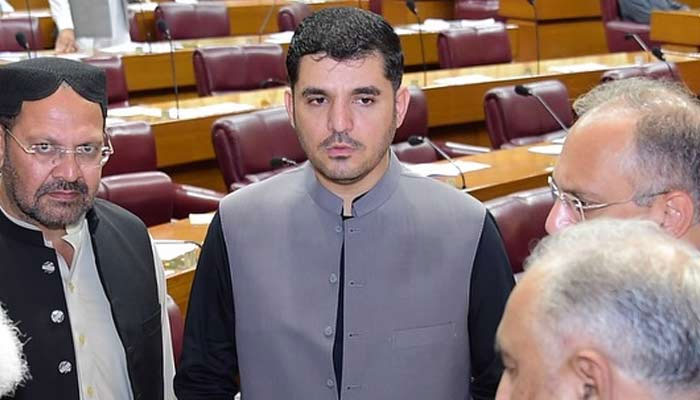SC nixes ECP order, restores Bazai’s NA membership
Court further says that since main appeals had been allowed, applications were also disposed of accordingly
ISLAMABAD: The Supreme Court on Thursday set aside an Election Commission of Pakistan (ECP) order and restored the National Assembly membership of Adil Bazai as an independent member from NA-262, Quetta.
A three-member bench of the apex court, headed by Justice Syed Mansoor Ali Shah and comprising Justice Ayesha A Malik and Justice Aqeel Ahmed Abbasi, accepted the appeals of Bazai against the ECP order, disqualifying him under Article 63-A of the Constitution.
“For reasons to be recorded later, these appeals are allowed and the impugned judgements passed by the Election Commission of Pakistan are set aside,” the court announced in a short order.
The court held that the declarations made by the party head of PMLN that the appellant had defected from the said political party are not confirmed.
Bazai’s membership of the National Assembly from seat NA-262 stands restored as an independent member, not as a member of the parliamentary party of PMLN.
The court further held that since the main appeals had been allowed, the applications were also disposed of accordingly.
The ECP had previously disqualified Bazai under Article 63-A after PMLN President Nawaz Sharif filed a petition to the electoral body after Bazai reportedly voted against the party lines during the 26th Constitutional Amendment.
Earlier, during the course of hearing, the court raised various questions on the procedure adopted by the ECP in the matter.
Justice Ayesha A Malik asked as to what kind of inquiry was conducted by the ECP to verify the facts in Bazai’s case. Similarly, Justice Abbasi remarked it was not acceptable to de-seat a person just because a letter from a senior official had arrived. Justice Mansoor pointed out that the criteria for disenfranchising an entire constituency should be rigorous.
Sardar Taimoor, counsel for Adil Bazai, submitted before the court that the matter has been raised before the electoral body, and the following day, the action was taken against his client without any proper documentation.
The counsel contended that they had moved the Balochistan High Court and pleaded for getting the necessary documents, particularly a sworn affidavit mentioning Bazai’s affiliation with the PMLN. However, he alleged that the ECP refused to provide it for being confidential.
At this, Justice Ayesha called the ECP’s DG Law to rostrum and questioned as to why the electoral body had accepted one affidavit as valid without conducting an inquiry. “Whether the ECP could simply reject one affidavit and accept another without thorough verification,” she asked the ECP DG Law. Justice Ayesha questioned as to whether the ECP considered itself above the law and whether it had disregarded the courts and magistrates.
Similarly, Justice Mansoor asked the ECP DG as to whether the electoral body had the authority to conduct a trial in such a case and further asked as to how it attained trial court powers.
-
 Will There Be 'Smiling Friends' Season 4? Animated Series' Creators Make Big Announcement
Will There Be 'Smiling Friends' Season 4? Animated Series' Creators Make Big Announcement -
 Jennifer Aniston, Boyfriend Jim Curtis Prepare To Move In After 'hard Launching' Their Relationship?
Jennifer Aniston, Boyfriend Jim Curtis Prepare To Move In After 'hard Launching' Their Relationship? -
 Lamar Odom Details Struggle With Addiction And ‘amazing’ Rehab Experience
Lamar Odom Details Struggle With Addiction And ‘amazing’ Rehab Experience -
 Nvidia Vs Intel: Jensen Huang Braces Investors For Renewed Battle As Chip Wars Reignite
Nvidia Vs Intel: Jensen Huang Braces Investors For Renewed Battle As Chip Wars Reignite -
 Heidi Montag Reveals Why She Felt 'robbed' On 'The Masked Singer' After Her Elimination
Heidi Montag Reveals Why She Felt 'robbed' On 'The Masked Singer' After Her Elimination -
 Australia’s Former PM Gives His Honest Take Against The British Monarchy: ‘It Remains This Anachronism’
Australia’s Former PM Gives His Honest Take Against The British Monarchy: ‘It Remains This Anachronism’ -
 Bombshell Reason Behind Cardi B, Stefon Diggs' Breakup Revealed
Bombshell Reason Behind Cardi B, Stefon Diggs' Breakup Revealed -
 Hilary Duff Details How She Protected Her Children’s Mental Health Amid Divorce
Hilary Duff Details How She Protected Her Children’s Mental Health Amid Divorce -
 'The Masked Singer's Snow Cone's Identity Revealed
'The Masked Singer's Snow Cone's Identity Revealed -
 Kash Patel Fires FBI Officials Behind Trump Mar-a-Lago Documents Probe, Reports Say
Kash Patel Fires FBI Officials Behind Trump Mar-a-Lago Documents Probe, Reports Say -
 Martin Short's Daughter Katherine's Death Takes Shocking Turn As Terrific Details Emerge
Martin Short's Daughter Katherine's Death Takes Shocking Turn As Terrific Details Emerge -
 Jeff Galloway, Olympian, Author, Running Legend, Dead At 80
Jeff Galloway, Olympian, Author, Running Legend, Dead At 80 -
 Patrick Dempsey Reacts To Tragic Death Of His 'Grey's Anatomy' Co-star Eric Dane
Patrick Dempsey Reacts To Tragic Death Of His 'Grey's Anatomy' Co-star Eric Dane -
 Sidney Crosby Injury News Shakes Penguins After Olympic Tournament
Sidney Crosby Injury News Shakes Penguins After Olympic Tournament -
 Yankees Honour CC Sabathia With No. 52 Retirement This September
Yankees Honour CC Sabathia With No. 52 Retirement This September -
 Cuban Government Says Boat Full Of Armed Men Fired On Border Guards, Killing 4
Cuban Government Says Boat Full Of Armed Men Fired On Border Guards, Killing 4




